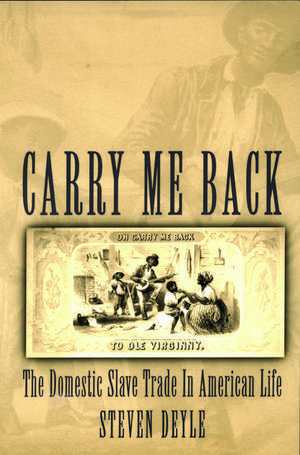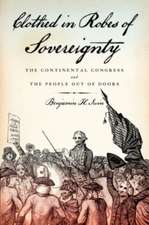Carry Me Back: The Domestic Slave Trade in American Life
Autor Steven Deyleen Limba Engleză Paperback – 31 aug 2006
Preț: 223.36 lei
Nou
Puncte Express: 335
Preț estimativ în valută:
42.74€ • 45.70$ • 35.64£
42.74€ • 45.70$ • 35.64£
Carte tipărită la comandă
Livrare economică 07-12 aprilie
Preluare comenzi: 021 569.72.76
Specificații
ISBN-13: 9780195310191
ISBN-10: 0195310195
Pagini: 416
Ilustrații: 24 halftones, 2 maps
Dimensiuni: 156 x 236 x 28 mm
Greutate: 0.61 kg
Editura: Oxford University Press
Colecția OUP USA
Locul publicării:New York, United States
ISBN-10: 0195310195
Pagini: 416
Ilustrații: 24 halftones, 2 maps
Dimensiuni: 156 x 236 x 28 mm
Greutate: 0.61 kg
Editura: Oxford University Press
Colecția OUP USA
Locul publicării:New York, United States
Recenzii
"A fine book-by far the best work to date on the subject"--The Atlantic Monthly
"Carry Me Back is a book we have long needed--a synthetic, region-wide treatment of the domestic slave trade. Deyle's deep research and lucid writing convincingly show that the sale and transport of human property from the upper to lower South was a national tragedy of epic proportions, a grand economic enterprise that both forged the Cotton Kingdom and was the root of its undoing. Behold! The story of how the largest source of wealth in antebellum America belongs at the center of our national narrative, and how it haunts us still."--David W. Blight, author of Race and Reunion: The Civil War in American Memory and Director, the Gilder Lehrman Center for the Study of Slavery, Resistance and Abolition, Yale University
"Carry Me Back takes us far beyond what we already know about the importance of the domestic slave trade. Steven Deyle shows us just how tightly entwined the domestic slave trade actually became with the overall development of the nation itself, North no less than South, and how it dictated the direction of our history in so many significant ways. Ambitiously conceived and skillfully executed, this is a study that all students of the antebellum era surely must read."--James Brewer Stewart, author of Holy Warriors: The Abolitionists and American Slavery
"Prodigiously researched and convincingly argued, Steven Deyle's Carry Me Back places the slave market at the center of the nineteenth-century United States. Carry Me Back tells the story of the disastrous effects of that market on black lives, of its crucial place in the Southern market revolution being pursued by their white masters, and of the role of images of the trade in the argument of nineteenth-century opponents of slavery. The information necessary to dismantle U.S. slavery, it turns out, was produced along the bloody leading edge of its commercial economy."--Walter Johnson, author of Soul by Soul: Life Inside the Antebellum Slave Market
"Carry Me Back is a book we have long needed--a synthetic, region-wide treatment of the domestic slave trade. Deyle's deep research and lucid writing convincingly show that the sale and transport of human property from the upper to lower South was a national tragedy of epic proportions, a grand economic enterprise that both forged the Cotton Kingdom and was the root of its undoing. Behold! The story of how the largest source of wealth in antebellum America belongs at the center of our national narrative, and how it haunts us still."--David W. Blight, author of Race and Reunion: The Civil War in American Memory and Director, the Gilder Lehrman Center for the Study of Slavery, Resistance and Abolition, Yale University
"Carry Me Back takes us far beyond what we already know about the importance of the domestic slave trade. Steven Deyle shows us just how tightly entwined the domestic slave trade actually became with the overall development of the nation itself, North no less than South, and how it dictated the direction of our history in so many significant ways. Ambitiously conceived and skillfully executed, this is a study that all students of the antebellum era surely must read."--James Brewer Stewart, author of Holy Warriors: The Abolitionists and American Slavery
"Prodigiously researched and convincingly argued, Steven Deyle's Carry Me Back places the slave market at the center of the nineteenth-century United States. Carry Me Back tells the story of the disastrous effects of that market on black lives, of its crucial place in the Southern market revolution being pursued by their white masters, and of the role of images of the trade in the argument of nineteenth-century opponents of slavery. The information necessary to dismantle U.S. slavery, it turns out, was produced along the bloody leading edge of its commercial economy."--Walter Johnson, author of Soul by Soul: Life Inside the Antebellum Slave Market
Notă biografică
Steven Deyle is Assistant Professor of History at the University of California, Davis.
















